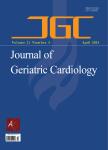Antithrombotic treatment tailoring and risk score evaluation in elderly patients diagnosed with an acute coronary syndrome
Antithrombotic treatment tailoring and risk score evaluation in elderly patients diagnosed with an acute coronary syndrome作者机构:Invasive Cardiology Unit Centre Hospitalier de Montlufon Montlufon France Carol Davila University of Medicine and Pharmacy Bucharest Romania Clinic of Cardiology University Clinical Centre of Kosova Prishtina Republic of Kosovo Comanche Memorial Hospital Lawton USA 5Cardiology Clinic Preveza Greece Cardiology Clinic Preveza Greece Department of Cardiovascular Sciences Sapienza University of Rome Rome Italy
出 版 物:《Journal of Geriatric Cardiology》 (老年心脏病学杂志(英文版))
年 卷 期:2017年第14卷第7期
页 面:442-456页
核心收录:
学科分类:0710[理学-生物学] 0832[工学-食品科学与工程(可授工学、农学学位)] 071010[理学-生物化学与分子生物学] 081704[工学-应用化学] 07[理学] 08[工学] 0817[工学-化学工程与技术] 083201[工学-食品科学]
基 金:the authors report no relationships that could be construed as a conflict of interest
主 题:Acute coronary syndrome Antithrombotic treatment Elderly patients Risk score evaluation
摘 要:Age is an important prognostic factor in the outcome of acute coronary syndromes (ACS). A substantial percentage of patients who ex- perience ACS is more than 75 years old, and they represent the fastest-growing segment of the population treated in this setting. These pa- tients present different patterns of responses to pharmacotherapy, namely, a higher ischemic and bleeding risk than do patients under 75 years of age. Our aim was to identify whether the currently available ACS ischemic and bleeding risk scores, which has been validated for the general population, may also apply to the elderly population. The second aim was to determine whether the elderly benefit more from a spe- cific pharmacological regimen, keeping in mind the numerous molecules of antiplatelet and antithrombotic drugs, all validated in the general population. We concluded that the GRACE (Global Registry of Acute Coronary Events) risk score has been extensively validated in the elderly. However, the CRUSADE (Can Rapid risk stratification of Unstable angina patients Suppress ADverse outcomes with Early imple- mentation of the ACC/AHA Guidelines) bleeding score has a moderate correlation with outcomes in the elderly. Until now, there have not been head-to-head scores that quantify the ischemic versus hemorrhagic risk or scores that use the same end point and timeline (e.g., ischemic death rate versus bleeding death rate at one month). We also recommend that the frailty score be considered or integrated into the current existing scores to better quantify the overall patient risk. With regard to medical treatment, based on the subgroup analysis, we identified the drugs that have the least adverse effects in the elderly while maintaining optimal efficacy.



